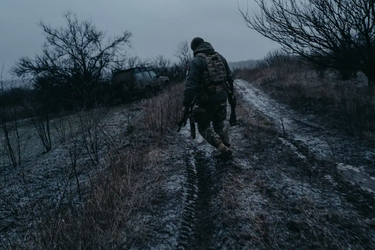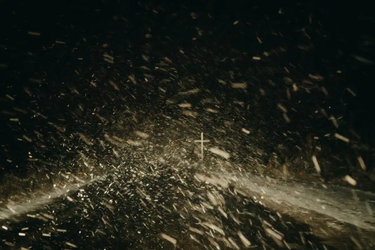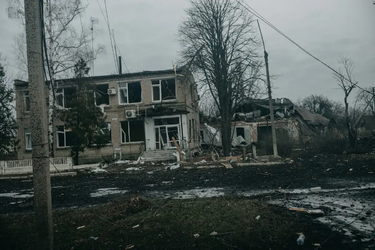
Military trucks are parked by a road in Donbas, Ukraine, on Saturday. (Wojciech Grzedzinski for The Washington Post)
The Ukrainian military is facing a critical shortage of infantry, leading to exhaustion and diminished morale on the front line, military personnel in the field said this week — a perilous new dynamic for Kyiv nearly two years into the grinding, bloody war with Russia.
In interviews across the front line in recent days, nearly a dozen soldiers and commanders told The Washington Post that personnel deficits were their most critical problem now, as Russia has regained the offensive initiative on the battlefield and is stepping up its attacks.
One battalion commander in a mechanized brigade fighting in eastern Ukraine said that his unit currently has fewer than 40 infantry troops — the soldiers deployed in front-line trenches who hold off Russian assaults. A fully equipped battalion would have more than 200, the commander said.
Another commander in an infantry battalion of a different brigade said his unit is similarly depleted.
The soldiers interviewed spoke on the condition of anonymity because they were not authorized to speak publicly and could face retribution for their comments.

A Ukrainian soldier walks near a firing position in Donbas. (Wojciech Grzedzinski for The Washington Post)
The reports of acute troop shortages come as President Volodymyr Zelensky is preparing to replace his military chief, Gen. Valery Zaluzhny, with one chief disagreement being over how many new soldiers Ukraine needs to mobilize.
The Ukrainian presidential office declined to comment, referring questions to the Defense Ministry, which in turn referred questions to the Ukrainian military’s General Staff. The General Staff did not respond to a request for comment.
Zaluzhny has told Zelensky that Ukraine needs nearly 500,000 new troops, according to two people familiar with the matter, but the president has pushed back on that figure privately and publicly. Zelensky has said he wants more justification from Ukraine’s military leadership about why so many conscripts are needed and has also expressed concern about how Kyiv would pay them.
Financial assistance from Western partners cannot be used to pay soldier salaries, and Ukraine’s budget is already under strain, with a $60 billion aid package proposed by President Biden stalled in Congress. The European Union last week approved roughly $54 billion in aid after it was delayed for weeks by opposition from Hungarian Prime Minister Viktor Orban.
The debate in Kyiv about mobilization — and to what degree the country should ramp it up — has angered soldiers on the front line.
Oleksandr, a battalion commander, said the companies in his unit on average are staffed at about 35 percent of what they should be. A second battalion commander from an assault brigade said that is typical for units that carry out combat tasks.

Light catches a cross on the side of the road during a snowstorm in Donbas on Saturday. (Wojciech Grzedzinski for The Washington Post)
Asked how many new soldiers he has received — not including those who have returned after injuries — Oleksandr said his battalion was sent five people over the past five months. He and other commanders said the new recruits tend to be poorly trained, creating a dilemma about whether to send someone immediately onto the battlefield because reinforcements are needed so badly, even though they are likely to get injured or killed because they lack the know-how.
“The basis of everything is the lack of people,” Oleksandr said.
“Where are we going? I don’t know,” he added. “There’s no positive outlook. Absolutely none. It’s going to end in a lot of death, a global failure. And most likely, I think, the front will collapse somewhere like it did for the enemy in 2022, in the Kharkiv region.”
In fall 2022, the Ukrainians took advantage of a weak spot in the Russian front line, where Moscow’s forces were undermanned, and managed to liberate most of the northeast region in a swift one-week September offensive. Russian President Vladimir Putin responded to the embarrassing defeat by announcing a mobilization in his country.
The Ukrainian parliament is in the process of revising a draft law on mobilization that will lower the minimum conscription age from to 25 from 27. But lawmakers working on the bill and soldiers alike have acknowledged that Kyiv has done a poor job explaining to the public why sending more people to the front is necessary.
Instead, the messaging has been confused, with Zelensky and Zaluzhny contradicting each other publicly and creating an appearance of infighting.

New recruits train in Donbas on Monday. (Wojciech Grzedzinski for The Washington Post)
In August, Zelensky fired the heads of all of Ukraine’s regional military recruitment offices, citing concerns about corruption. But with some of those positions left vacant, mobilization came to a halt, a high-ranking military official said. Commanders in the field confirmed that they have had few new people arrive since the fall.
“We have direct trouble with personnel,” said Mykyta, a deputy infantry battalion commander. “Because this is war, and it’s infantry in defense that’s dying.”
“I’m talking with my friends, also officers in other units, and those in infantry; it’s almost the same situation everywhere,” Mykyta added.
Shortages of ammunition and weapons are also an issue. A commander whose unit was recently moved to a new part of the front in eastern Ukraine said he received 10 shells for two howitzers. Zelensky has acknowledged that artillery ammunition deliveries have slowed as Europe struggles to manufacture enough shells to meet Ukraine’s needs and as the aid package remains stalled in Washington.
The personnel shortages can have a domino effect, Ukrainian troops in the field said.

Damaged houses in the Donbas region, seen on Saturday. (Wojciech Grzedzinski for The Washington Post)
Especially in winter, when the weather conditions are hard, infantry should be rotated out after about three days. But because units lack troops, deployments get extended — or personnel intended for the rear get pressed into front-line duty despite being ill-prepared for it. Troops who are mentally and physically exhausted because of overwork sometimes can’t defend their posts, allowing Russia — with more manpower and ammunition — to advance.
“They need to be replaced by someone,” said Oleksandr, the battalion commander. “There is no one to replace them, so they sit there more, their morale drops, they get sick or suffer frostbite. They are running out. There is no one to replace them. The front is cracking. The front is crumbling. Why can’t we replace them? Because we don’t have people; nobody comes to the army. Why doesn’t anyone come to the army? Because the country didn’t tell people that they should go to the army. The state failed to explain to people that they should go to the army. Those who knew that they should go, they have already all run out.”
Serhiy, 41, a platoon commander fighting in Avdiivka, the site of Russia’s most intense assaults, said he and his men are rarely rotated out after just three days. More often five days go by — or even 10.

Serhiy, 41, a platoon commander fighting in Avdiivka. (Wojciech Grzedzinski for The Washington Post)
Dmitry, another deputy battalion commander in a different brigade, said his infantry typically get two days of rest after five to 10 days holding the line, and because most of his soldiers are over the age of 40, their lack of physical fitness compounds the problems.
“You can feel it; people are exhausted both morally and physically,” Serhiy said. “It’s very hard, the weather conditions, the constant shelling. They have a great impact on the human psyche.”
The lack of rotations is a problem across the Ukrainian military — not just for infantry on the line. Soldiers might get a few days off to go home and see their families, but rarely more. They say they are still motivated to fight the Russian invaders, but also that they need rest and more men beside them.
Zelensky has also asked the military and parliament to prepare a law to demobilize those who have been fighting for nearly two years. Members of parliament working on the bill have said they are discussing a plan to discharge, or “demobilize,” soldiers who have been on the front for 36 months. But that would require sending people in to replace them.
“Every soldier thinks about that guy that walks around in Dnipro or Lviv or Kyiv,” Mykyta said. “They think about them and they want to have a rest, too. Of course, in their heads appears the thought: Some guys are just strolling around there, but we’re here.”

Soldiers fire a D-30 howitzer from a position in Donbas. (Wojciech Grzedzinski for The Washington Post)
Article Link
Archive
